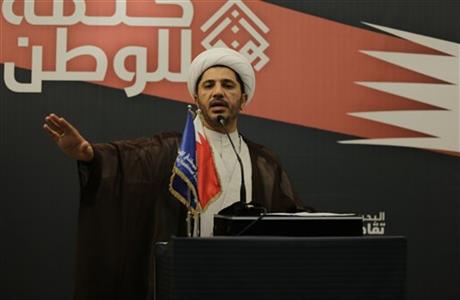
By REEM KHALIFA
The UN human rights chief on Tuesday called on Bahrain’s government to immediately release the leader of the country’s main Shiite opposition group and the European Union warned that his arrest could further destabilize an already fragile political environment.
Sheikh Ali Salman’s arrest on Sunday has been widely viewed as an escalation that is likely to deepen the political standoff between the Arab nation’s majority Shiite population and its Sunni-led monarchy.
Public prosecutors on Tuesday said Salman would remain in custody for another seven days pending further investigations into statements that allegedly incited violence. The prosecution announced Salman’s week-long detention on its official Twitter page, but did not mention Salman by name.
The spokesperson for the UN High Commissioner for Human Rights, Liz Throssell, urged Bahrain’s government to immediately release Salman, “as well as all other persons convicted or detained for merely exercising their fundamental rights to freedom of expression and assembly.”
The EU said his arrest “carries the risk of jeopardizing an already difficult political and security situation.”
Both the UN and EU statements said dialogue and national reconciliation were the only way out of Bahrain’s current crisis.
Bahrain’s Attorney General Nayef Mahmoud said that prosecutors were following up on Interior Ministry accusations that Salman incited people to break the law, promoted political change through illegal force, incited hatred against specific segments of the society and defamed a governmental body.
Salman, 49, heads the opposition group al-Wefaq. It boycotted last month’s parliamentary elections and has been leading calls for reform for years.
The group has played a leading role in the mostly Shiite-led protests that erupted in February 2011 demanding greater power-sharing between elected lawmakers and the Sunni monarchy, the release of political prisoners and a prime minister chosen by elected officials and not the king. Hundreds of protesters took to the streets for the third day this week to demand his release.
Salman’s defense lawyer Abdulla al-Shamlawi told The Associated Press he is being accused of inciting hatred against the monarchy and calling for its overthrow in a series of speeches made since 2012.
Al-Shamlawi said Salman was asked specifically about a sermon he gave in July 2013 in which he said taking up arms is still an option, but is an option that has been rejected by the opposition since 1992.
The attorney general said that the content and nature of Salman’s statements “had significantly escalated from incitement and hate speech, ultimately to threats of military force against the state, including the imminent option to deploy methods currently used by armed groups operating elsewhere in the region.”
Mahmoud said prosecutors are examining recordings of Salman’s speeches and statements, adding that Salman was questioned by prosecutors in the presence of four lawyers and had been provided with the opportunity to meet his legal team in private.
The attorney general said Salman “would be afforded every legal right as the process continues.”
The U.S. State Department said Bahrain must provide Salman equal treatment under the law and seek to “advance justice in a transparent and fair and predictable way.” Bahrain is host to the U.S. Navy’s 5th Fleet.
Salman was previously arrested in 1994 for almost three weeks in relation to his political activity. He was deported from Bahrain in 1995 and lived in the U.K. until 2001, before returning home during a period of reconciliation talks between the monarchy and the opposition.


